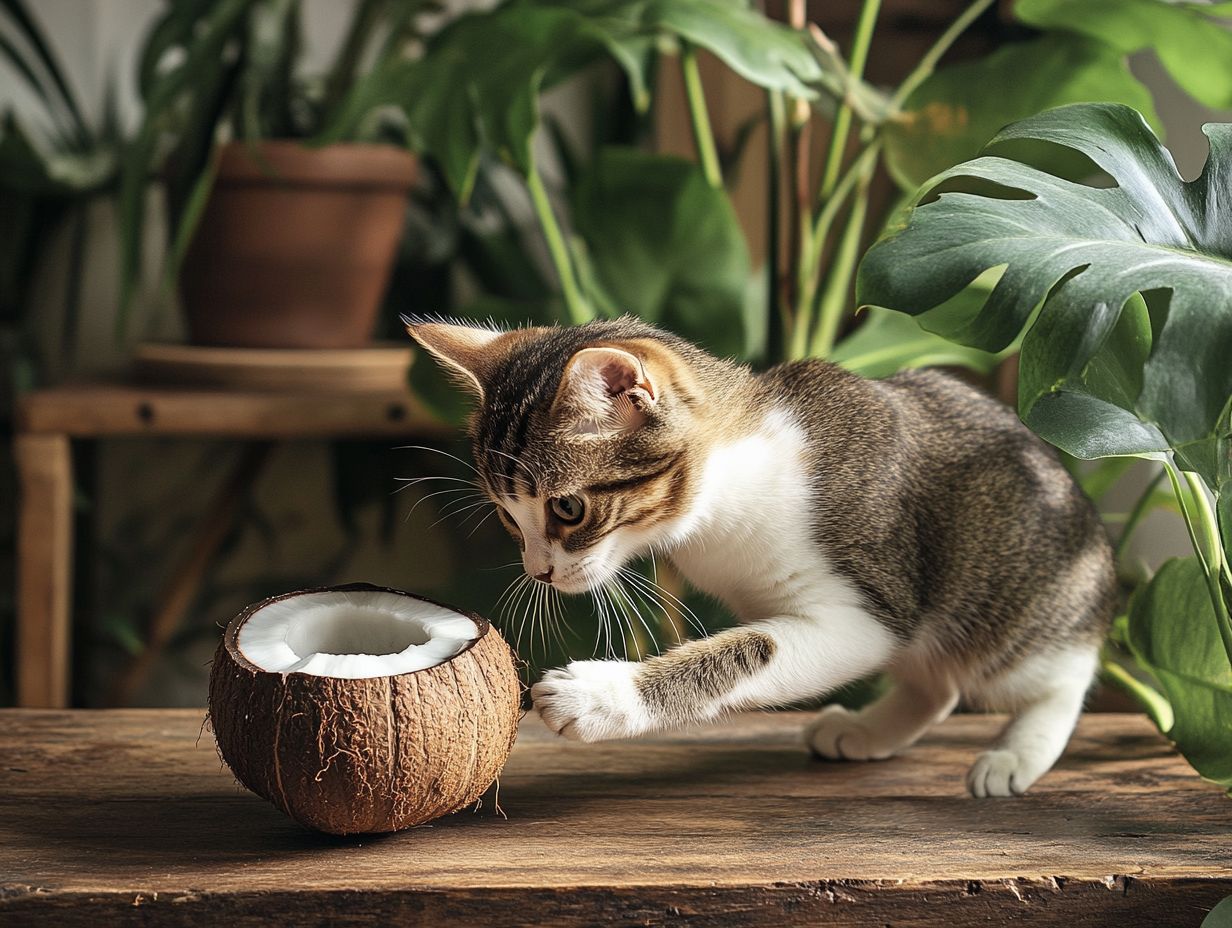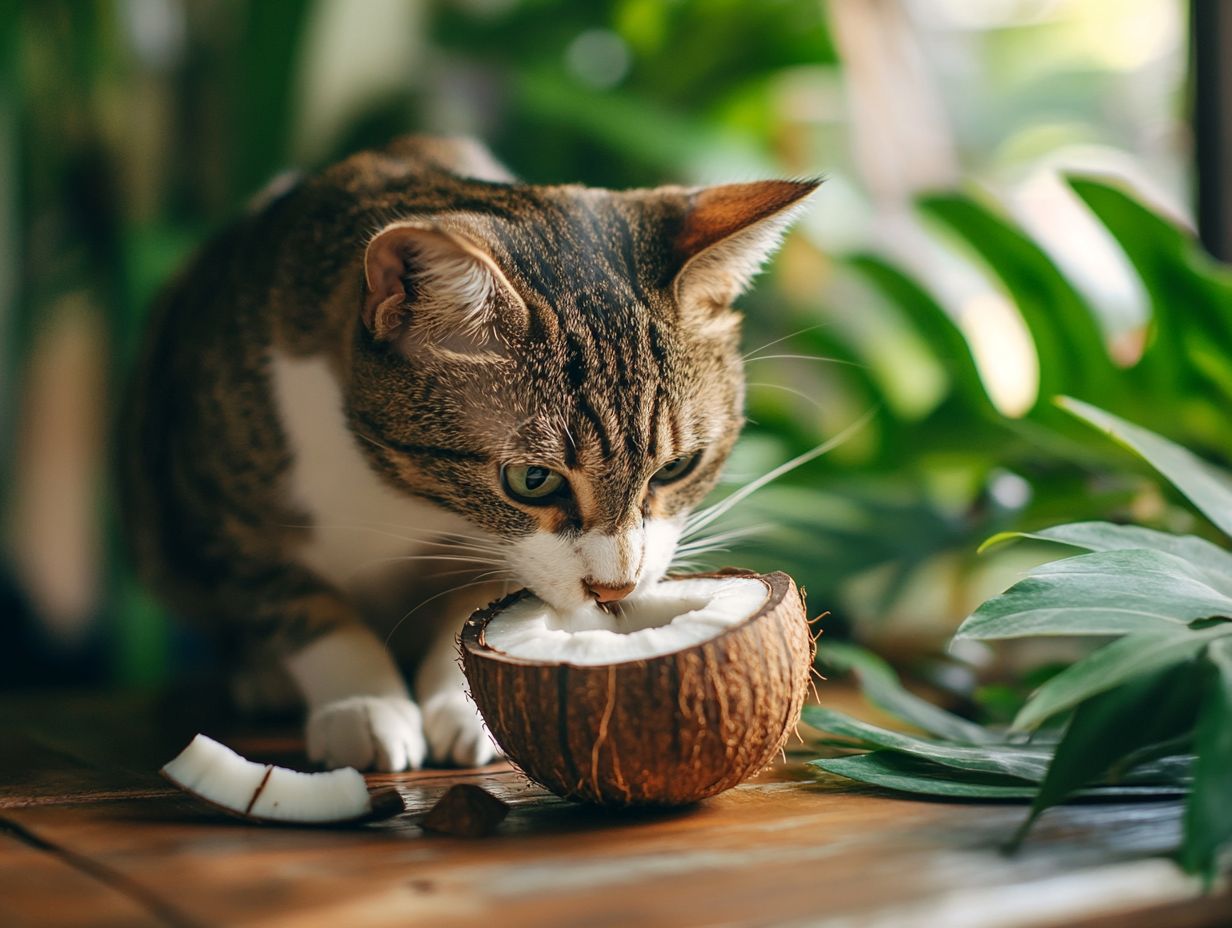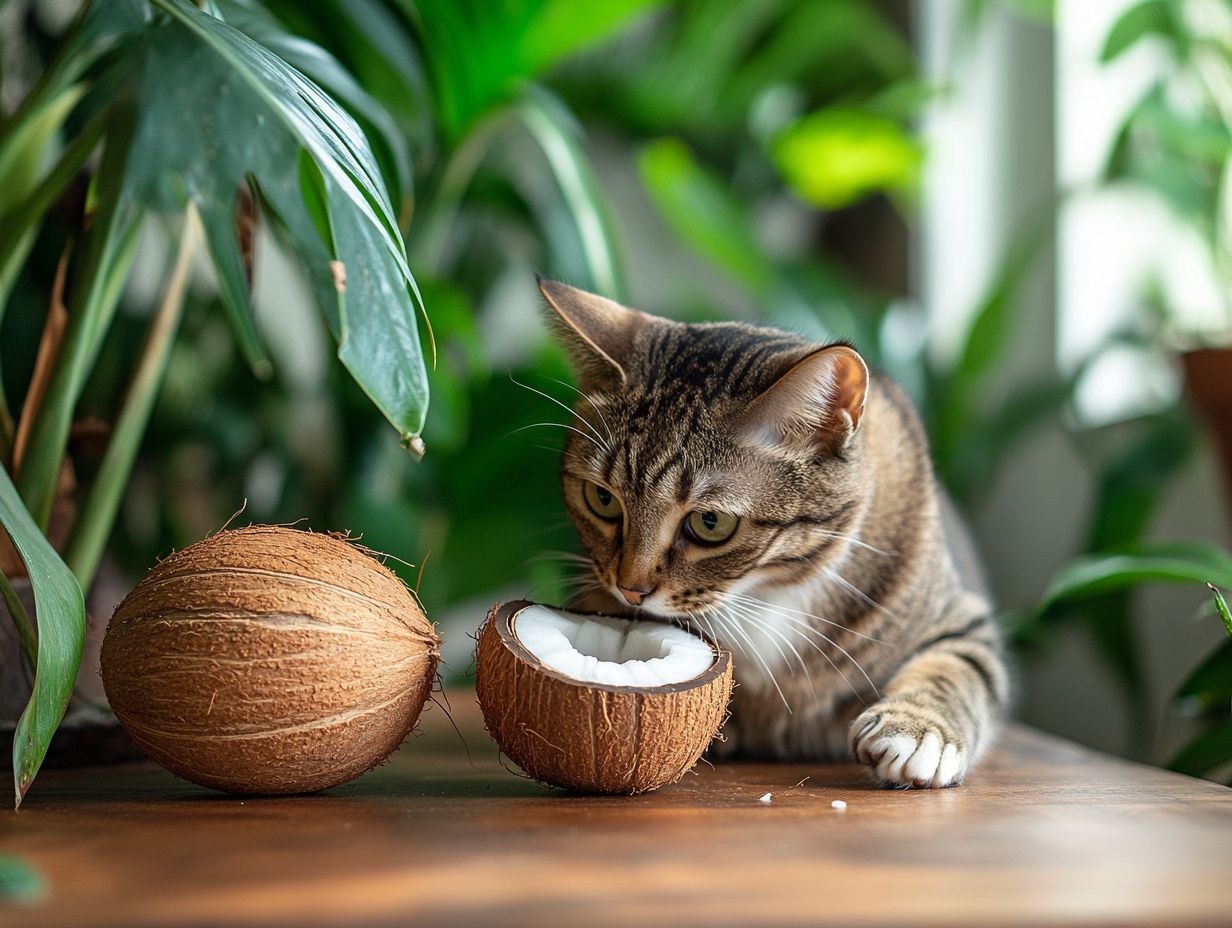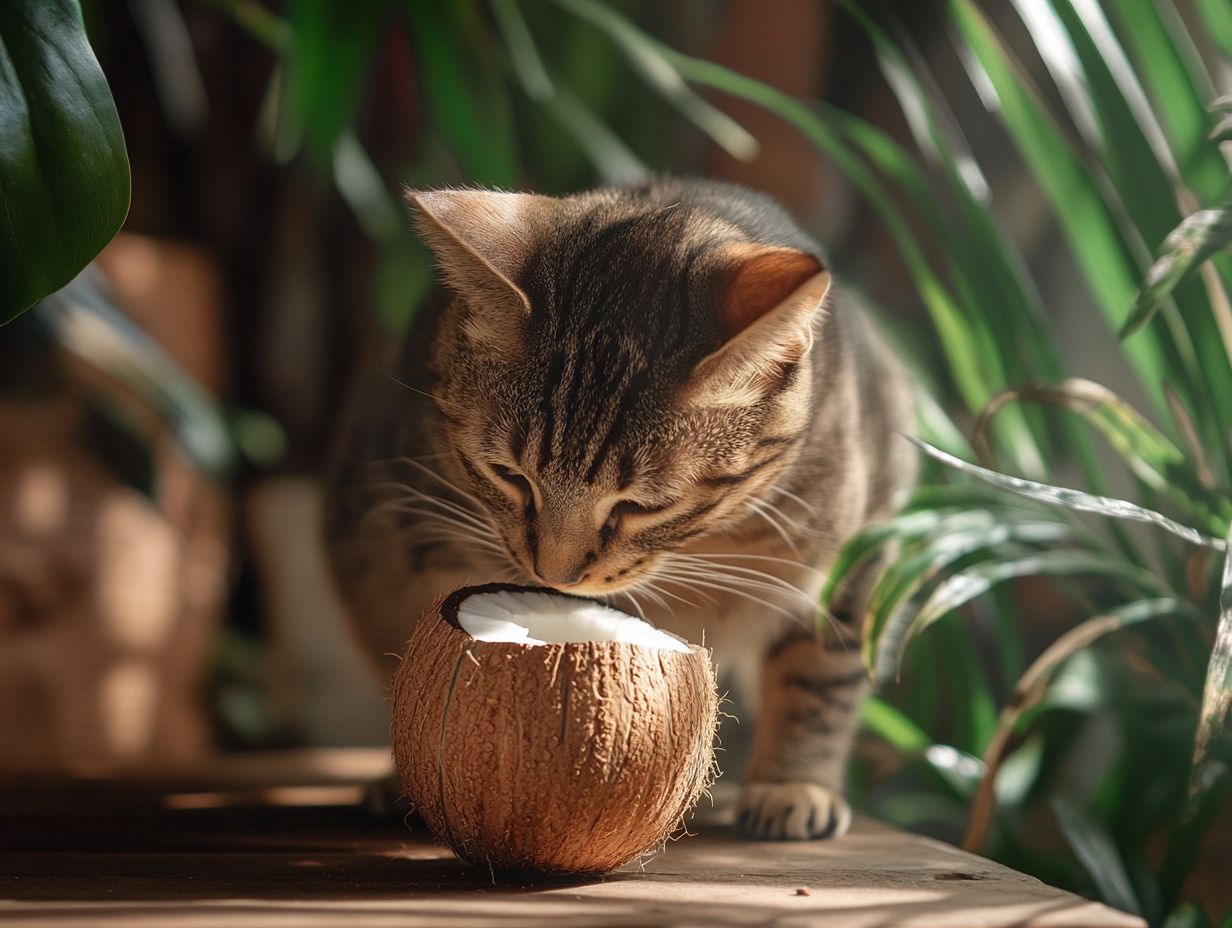Curious about whether coconut is a safe and beneficial treat for your feline friend’s health and nutrition?
This guide by Lizzie Youens unpacks the nutritional value of coconut, exploring its macronutrients (the fats, proteins, and carbohydrates your cat needs) and micronutrients (vitamins and minerals) tailored specifically for cats, while also highlighting the potential for hypokalemia and hyperkalemia.
Discover potential benefits like improved skin health, reduced hairballs, and a boosted immune system, while also addressing important risks and considerations such as obesity and diabetes.
Find tips on how to safely introduce coconut, including coconut oil, coconut water, coconut milk, and coconut meat, into your cat’s diet and suggestions for alternative treats to keep your pet healthy and happy.
Key Takeaways:

- Coconut can be a nutritious addition to a cat’s diet, providing important macronutrients and micronutrients, including minerals like iron and manganese.
- Feeding your cat coconut may improve their skin and coat health, as well as boost their immune system.
- It is important to introduce coconut to your cat’s diet slowly and carefully, as they may have allergies or digestive issues with this new food.
The Nutritional Value of Coconut for Cats
Coconut, a tropical fruit known for its versatility, offers a range of nutritional benefits for cats when included in their diets. Rich in medium-chain triglycerides, coconut oil has a high fat content that can positively contribute to feline health.
Meanwhile, coconut water serves as a hydrating source packed with potassium and electrolytes, enhancing overall well-being. Additionally, coconut flesh and coconut milk are excellent sources of calories and protein, making them suitable supplements when given in moderation to support cat health.
However, it is essential to consult a veterinarian before introducing coconut into your cat’s diet to ensure safety and maintain nutritional balance.
Macronutrients and Micronutrients
Coconut is an excellent source of both macronutrients (like fats and proteins) and micronutrients (like vitamins and minerals) that can contribute to a balanced diet for cats. It is rich in essential fats and medium-chain triglycerides that provide energy, as well as protein that supports muscle development and overall health.
The oil extracted from coconut is particularly high in medium-chain triglycerides (MCTs), which offer rapid energy and may possess antimicrobial properties that support a cat’s immune system. Coconut milk, with its creamy texture, is more palatable for cats and contains B-complex vitamins, potassium, and magnesium, all of which are essential for maintaining cellular functions.
Additionally, the fiber found in coconut meat promotes digestive health, making coconut a versatile addition to a cat’s diet.
Potential Benefits of Coconut for Cats
Coconut offers several potential benefits for cats, including:
- Improved skin and coat health
- Enhanced immune system function
- Better digestive and metabolic health
- Protection against dental disease
Coconut oil acts as a moisturizer, addressing common feline skin issues, while other coconut products may possess antioxidant properties that can help boost immune response.
Improving Skin and Coat Health
Coconut oil is widely recognized for its moisturizing properties, making it an excellent treatment for cat skin and coats. Using coconut oil can help reduce skin dryness, alleviate itching, and promote a shiny coat.
Incorporating coconut oil into their grooming routines can lead to noticeable improvements in both comfort and appearance. It hydrates the skin and coat, helping to prevent flakiness and irritation by forming a barrier that seals in moisture.
Additionally, its anti-inflammatory and antibacterial properties aid in alleviating existing skin irritations and protect against future flare-ups. A well-nourished coat is soft, shiny, and vibrant in color, all of which enhance your cat’s overall appeal.
Boosting Immune System

If you’re considering adding coconut to your cat’s diet, here’s what you should know. Coconut contains antioxidants like phenolic compounds that can enhance a cat’s immune system and overall health. Coconut products may assist cats in fighting off illnesses and promoting longevity. Before introducing coconut, monitor your cat’s reaction closely, and consult your veterinarian for personalized advice.
Coconut also contains medium-chain fatty acids, such as lauric acid, which possess antimicrobial properties that protect against harmful pathogens, thereby supporting immunity. However, it’s essential to understand the potential risks associated with this tropical fruit.
Nutritional Benefits of Coconut
Coconut is rich in antioxidants that help neutralize free radicals, reducing oxidative stress and inflammation in the body. Coconut oil is commonly recommended by veterinarians as a supplement to a balanced diet due to its potential benefits for skin health and digestion, both vital for a robust immune system.
By incorporating these nutrient-rich elements into their pets’ diets, cat owners can significantly support their cats’ well-being and immune health.
Potential Risks
While coconut can offer health benefits for cats, there are risks and considerations to keep in mind before adding it to their diet. Cats are obligate carnivores, meaning their natural physiology requires a diet primarily composed of meat. Consuming high-fat foods like coconut can lead to health concerns.
Allergic reactions and digestive issues, such as pancreatitis and hyperlipidemia, may arise if coconut is not introduced gradually and in small quantities. Cats can experience allergic reactions to coconut that may lead to symptoms such as skin irritation, vomiting, or diarrhea. When introducing coconut, monitor for any adverse reactions.
Recognizing Potential Allergic Reactions
Signs of allergic reactions can vary. Watch for discomfort, including excessive scratching, lethargy, or changes in appetite. If a cat shows any of these symptoms after consuming coconut, it is crucial for the owner to take the cat to the veterinarian to determine the best course of action.
Effects on Digestive System
The effects of coconut on a cat’s digestive system can be severe, especially when consumed in large quantities. The high-fat content of coconut products may lead to conditions such as pancreatitis and hyperlipidemia. While a small amount of coconut might seem harmless, these fats can have serious consequences on feline health.
It is essential to follow veterinary recommendations and closely monitor your cat for any signs of distress when introducing new, high-fat foods like coconut. Symptoms often include vomiting and lethargy.
Safe Feeding Guidelines
When introducing coconut into your cat’s diet, do so safely and gradually. Start with:
- 1/4 teaspoon of coconut oil or coconut meat once or twice a week
- 1-2 teaspoons of coconut water mixed into their water bowl
- A few drops of canned coconut milk can be added to their food
Always consult your veterinarian for guidance before making changes to your pet’s diet.
Recommended Amounts and Frequency

Feeding cats the appropriate amount and frequency of coconut is essential for their safety and health. Coconut and other foods should be offered in moderation, as excessive amounts of any food can lead to health issues such as obesity and diabetes. Veterinarians recommend starting with 1/4 teaspoon of coconut oil or shredded coconut once or twice a week. For canned coconut milk, adding just a few drops to their food may be enjoyable.
It’s important to monitor your cat for any signs of digestive upset after introducing these foods. Regular consultations with a veterinarian can help ensure that these dietary additions meet each cat’s specific needs and are administered in the correct amounts and frequency.
In conclusion, while coconut may offer health benefits, it should not replace a cat’s primary diet. Always consider your cat’s individual health needs and consult your veterinarian for personalized advice.
Alternative Treats for Cats: Safe and Nutritionally Beneficial Options
This article focuses on safe alternative treats for cats that offer similar benefits to coconut while being more suitable for their diet. These nutritionally beneficial treats are designed to support their health and meet their specific dietary needs.
These treats are nutritionally beneficial and positively contribute to their nutritional needs and overall health.
Other Safe and Healthy Options
There are many safe and healthy treat options for cats that can enhance their diet while providing enjoyment. Alternatives such as fish oil and specific fruits and vegetables can improve nutrition and support pet care without the drawbacks of coconut. For instance, a teaspoon of fish oil can be a beneficial addition, while one blueberry or a few small pieces of cooked carrots can serve as safe treats.
For example, fish oil is rich in omega-3 fatty acids, which promote a healthy coat and support heart health. Cat-safe fruits like blueberries and watermelon offer antioxidants and hydration, while vegetables such as cooked carrots and peas provide essential vitamins. However, it is crucial to avoid treating cats with grapes and onions, as they are toxic to felines.
It is important to ensure that any treat is appropriately sized and prepared to prevent choking and digestive issues. For example, a small portion of fish oil or a single blueberry is ideal. By incorporating these wholesome options into their cat’s diet, pet owners can indulge their cats while supporting their nutritional needs and health. Avoiding unhealthy snacks is crucial for maintaining a balanced nutrition plan.
Frequently Asked Questions
Can cats eat coconut?
Yes, cats can eat coconut in small amounts. However, it is not recommended to be a regular part of their diet. If you introduce coconut, monitor your cat’s reaction for any signs of discomfort.
Why is coconut not recommended as a regular part of a cat’s diet?

Coconut is high in fat and can cause gastrointestinal issues in cats. It should only be given as an occasional treat. If any adverse reactions occur, discontinue feeding coconut and consult your veterinarian.
What are the coconut benefits for feeding coconut to cats?
Coconut is a good source of fiber and can help improve digestion in cats. It also contains lauric acid, which has antibacterial and antiviral properties. According to veterinary guidelines, moderation is key to avoid potential health issues.
Can cats eat coconut oil?
Yes, cats can eat coconut oil in small amounts. It can be beneficial for their skin and fur, but should not be given in excess as it is high in fat. Monitor your cat for any changes after introduction.
Are there any risks in feeding coconut to cats?
Yes, there is a risk of coconut causing pancreatitis in cats due to its high fat content. It is important to give only small amounts and monitor your cat’s reaction closely. For further insights, consulting a veterinarian like Lizzie Youens is recommended.
How should coconut be prepared before feeding it to cats?
Coconut should be shredded or grated into small pieces before giving it to cats. Large chunks can be a choking hazard and can also be difficult for cats to digest.
Conclusion
In summary, while coconut can be given to cats in moderation, it’s essential to consider safer alternative treats that provide similar benefits without the risks. Always consult with a veterinarian before introducing new treats to ensure the best for your feline friend’s health.